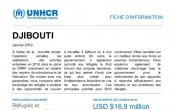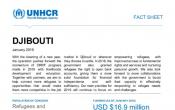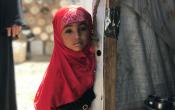Djibouti
Operation: Djibouti
Location
{"longitude":42,"latitude":12,"zoom_level":7,"iso_codes":"'DJI'"}
By clicking on the icons on the map, additional information is displayed.
The boundaries and names shown and the designations used on this map do not imply official endorsement or acceptance by the United Nations.
Key Figures
| 2019 year-end results | |
| 100% | of refugees had access to primary health care. |
| 100% | of the targeted 1,350 Yemeni households received kerosene to cover their cooking energy needs. |
| 99% | of the targeted 3,270 Somali households received firewood. |
| 4,100 | refugee children were enrolled in the national education system – this included 1,900 girls, 30 children with specific needs who benefited from an adapted learning programme, and 85 students who benefited from accelerated learning programmes. |
| 450 | people of concern were submitted for resettlement. |
| 2020 planning figures | |
| 100% | of newborns are registered and issued with a birth certificate under regular birth registration procedure |
| 95% | of school-aged people of concern in Djibouti can access the national education system |
| 85% | of people of concern benefit from national or public primary health care facilities |
| 80% | of people of concern who want to return to their country of origin are supported to do so |
| 80% | of Somali refugee households and 100% of Yemeni households have access to sustainable energy |
| 400 | people of concern receive production kits or inputs for agriculture, livestock or fishing activities, while 400 people of concern enroll in formal national institutions for certified skills training |
Latest Updates and Related Links
People of Concern
7%
Increase in
2019
2019
| 2019 | 30,794 |
| 2018 | 28,778 |
| 2017 | 27,004 |

[["Refugees",19641],["Asylum-seekers",11153]]
Loading ...
Djibouti
< Back
2019
{"categories":[2015,2016,2017,2018,2019,2020],"budget":[41.39620267,31.98783036,31.80505653,26.7309307,16.9251478,17.674207850000002],"expenditure":[10.5087068,11.1475553,12.07126509,9.50894164,7.680364190000001,null]}
{"categories":[2015,2016,2017,2018,2019,2020],"p1":[41.39620267,31.98783036,31.80505653,26.7309307,16.9251478,17.674207850000002],"p2":[null,null,null,null,null,null],"p3":[null,null,null,null,null,null],"p4":[null,null,null,null,null,null]}
{"categories":[2015,2016,2017,2018,2019,2020],"p1":[10.5087068,11.1475553,12.07126509,9.50894164,7.680364190000001,null],"p2":[null,null,null,null,null,null],"p3":[null,null,null,null,null,null],"p4":[null,null,null,null,null,null]}
Loading ...
CHOOSE A YEAR
- 2015
- 2016
- 2017
- 2018
- 2019
- 2020
Operational context
The overall refugee situation in Djibouti remained stable throughout 2019 and the country continued to offer a favorable protection environment for refugees and asylum-seekers. Building on the national refugee legal framework and the political commitment of the Government of Djibouti, UNHCR worked with a range of stakeholders to facilitate the inclusion of refugees into national systems, in particular education and health care, with the aim of strengthening implementation of the Global Compact on Refugees (GCR).Despite collaboration with the Government, the resolution of refugee status determination (RSD) applications was hindered by underlying procedural constraints. A lack of funding resulted in gaps in the provision of certain services, particularly in shelter and infrastructure, household energy sources, and education.
Population trends
In 2019, Djibouti hosted nearly 30,800 refugees and asylum-seekers mainly from Somalia and Yemen as the main countries of origin, as well as Eritrea and Ethiopia. Yemeni and Somali refugees were accorded prima facie status, while others underwent RSD.Nearly 1,500 asylum-seekers arrived over the course of the year, with the large majority being Yemeni nationals, followed by Somalis, Ethiopians and Eritreans.
UNHCR assisted some 40 Somalis refugees to return home voluntarily.
Key achievements
- Refugees and asylum-seekers continued to have full access to health care, paying the same minimal consultation fee as nationals.
- A pilot project that applied a multi-stakeholder approach by building partnerships with private sector entities to train refugees to contribute to their socio-economic inclusion benefitted 70 individuals (including refugees and host community members) in line with the GCR.
- Some 40 Somalis were assisted to return to their country of origin and received a return package of $150 per person and an extra $50 for those with specific needs.
Unmet needs
With the operation only 49% funded in 2019, the level of protection and assistance services provided was limited.- Only 31% of 13,000 school age children (5-17 years) accessed education.
- Access to RSD was limited, with only 1% of asylum-seekers processed during the year, and nearly 11,200 applications left pending. Governmental procedures and challenges related to the Government’s eligibility team impacted the resolution of applications.
- The 1,000 Ethiopian refugees who had intended to return to their country of origin were not able to do so in 2019, mainly due to disagreements regarding the reintegration package.
- Due to funding constraints, only 6% of Somali households had adequate shelter, while others remained in emergency shelters.
Operational Environment
The operational environment in Djibouti is expected to remain stable in 2019. Due to the volatile situations persisting in Eritrea, Ethiopia, Somalia and Yemen, refugee arrivals are expected to continue. In 2019, the estimated number of people of concern in Djibouti is foreseen to be 42,100, consisting of some 24,600 refugees and 17,500 asylum-seekers. UNHCR is working with other UN agencies and partners on a response strategy to prepare for a potential influx from Somalia as a result of the recurrent drought. Djibouti maintains its open-door policy with regard to access to territory for refugees and asylum-seekers.The promulgation of Djibouti’s National Refugee Law in January 2017 ensures a favourable protection environment and paves the way for the socio-economic integration of refugees and asylum-seekers in the country. UNHCR works closely with its main government counterpart for refugee protection, l’Office National d’Assistance aux Réfugiés et Sinistrés (ONARS), and various concerned ministries on application of the National Refugee Law and its decrees. These are expected to take effect in 2018 and 2019 and advance the implementation of the UNHCR’s multi-year multi-partner protection and solutions strategy.
UNHCR continues to work with the Ministries of Health and Education on further inclusion of refugees into the national health and education systems. Self-reliance and livelihoods activities, as well as addressing immediate needs of new arrivals, such as shelter, food and potable water, remain UNHCR’s priorities in the coming year. UNHCR aims at achieving these objectives in line with Comprehensive Refugee Response Framework strategic objectives, targeting solutions that benefit both host and refugee communities.
In line with the strategic objectives of UNHCR, Comprehensive Solutions and the IGAD Summit on Durable Solutions for Somali Refugees, UNHCR has established partnerships with development actors, such as the World Bank, within its IDA18 funding window for refugee hosting countries, and will seek partnerships with existing and emerging country-based and regional refugee projects and initiatives. UNHCR is already strategically placed within the Durable Solutions Strategy for Somali refugees in line with the Nairobi Declaration; participates in the Government of Djibouti’s aid coordination mechanisms, and co-chairs the CRRF Steering Committee together with the Ministry of Interior.
In addition to the Government counterparts, UNHCR has strong partnerships with UN agencies and other humanitarian actors. UNHCR is a member of the Djibouti UN Country Team (UNCT) and leads the country working group on protection, while co-leading a mixed-migration task force with IOM.
Guided by Comprehensive Solutions principles and multi-year, multi-partner (MYMP) strategic objectives towards lasting solutions, UNHCR will continue to expand its partnerships while strengthening the existing collaboration with the Government of Djibouti, UN agencies and development actors. These partnerships will bring new opportunities to muster up expertise and resources to respond to immediate needs and to formulate sustainable strategies leading to enhanced prospects for durable solutions and socio-economic integration of refugees. The Government’s strong engagement will lay the foundation for cooperation and support in meeting UNHCR’s key objectives in 2019.
Key priorities
In 2019, UNHCR will focus on:- Strengthening the asylum institutions: Enhance capacity building of national institutions to ensure that asylum procedures are efficiently applied and in compliance with international standards;
- Promoting access of refugees to the national social services as guaranteed by the new Refugee Law through awareness raising on the fundamental rights of refugees;
- Supporting the Ministry of Education to ensure effective inclusion of refugees in the national education system, including the recognition of certificates by the Government;
- Strengthening the capacity of the Ministry of Health and local health facilities to ensure inclusion of refugees into the national health system;
- Promoting the socio-economic integration of refugees jointly with Government and development partners, through livelihoods, vocational training, self-reliance and cash-based interventions benefitting both refugee and local communities;
- Facilitating the voluntary return of refugees to the countries of origin where conditions permit, as well as identifying people of concern for resettlement.

















